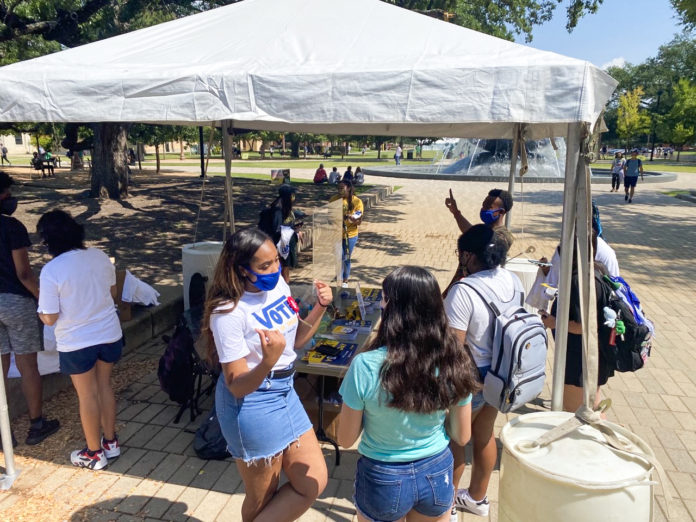
By Sarah Pinkerton | Staff Writer
Over the summer, President Linda Livingstone committed to 100% student voter registration and participation with the ALL IN Campus Democracy Challenge. As the presidential election nears, voter drives and panels continue on campus to reach this goal.
Dr. Mito Diaz-Espinoza, associate director for Civic Learning Initiatives and preparer of the 2020 Voting Education & Engagement Plan, said that reaching 100% success is hard to predict.
“If we get to the 100%, it would be phenomenal,” Diaz-Espinoza said. “And we would probably be studied for how we did that, but we know that’s a really big step because there’s a lot of challenges — whether it’s Voter ID Law, whether it’s registering to vote in time.”
He said that in 2018, 80% of Baylor students registered to vote but only 38% actually voted.
“Even if we can double our voter participation from 2018 to 80% that’ll be a huge step forward for us,” Diaz-Espinoza said.
The 2020 Voting Education & Engagement Plan says that while voting rates on campus increased by 23% from 2014 to 2018, the university is still below the national average.
“We attribute the gains we have seen to existing programs and anticipate further gains as we coordinate & grow collective campus efforts,” the statement said.
These voting rates are tracked by the “National Study of Learning, Voting and Engagement,” or the NSLVE, from Tufts University.
If students are unable to vote for any reason, Diaz-Espinoza said that participation is also defined by encouraging other individuals to register and spreading the word on voting.
“It’s not just voting,” Diaz-Espinoza said. “But trying to get students engaged and talking about voting, being educated voters and doing more. It being a presidential election year, it’s always a big push to register to vote and the vote.”
He said that they aim to raise voter registration on campus and do everything they can to get all eligible students registered to vote.
“Whether that’s here in McLennan County or in their home states and home counties, depending if they’re out of state students,” Diaz-Espinoza said. “And then, we want to work on voter participation, meaning actually going out and voting.”
Diaz-Espinoza said that the ALL-IN challenge wants to additionally establish a voting culture on campus.
“We want to have students educated, know what it means to look up a candidate, look up his or her stances and voting history so they’re educated and informed voters,” Diaz-Espinoza said.
He said there have been several voter registration drives on campus already. The National Association for the Advancement of Colored People and Alpha Kappa Alpha sorority have had one. Student Government is also planning an event.
The library also hosted a panel session focused on the 19th Amendment. The Academy for Leadership Development is additionally working with the Andrew Goodman Foundation, Voter Friendly Campus and the +1 The Vote.
“These collaboratives are valuable for learning communities and supply funding and opportunities for other resources,” the plan said.
The plan also stated the aim to identify key groups and individuals working in voter engagement efforts on campus and to continue to host campus forums on public issues through Baylor Public Deliberation Initiative.
“COVID restrictions might make [voting] a little more difficult, but that’s why we’re trying to educate students now,” Diaz-Espinoza said. “Encouraging them to make a voting plan, whether that means they’re going to vote early and not stand in the line or they’re going to go the day of, to have a plan for transportation.”
McKinney freshman Shea Berthelot has created a website called Party Lines and encourages fellow students to become educated on both sides of the political spectrum before voting. She said that she has committed to making the website as non-biased and non-partisan as possible.
Berthelot said that informed decision making is important because you are held accountable for what happens in the nation, and she believes it’s important to understand what you’re voting for.
“It just requires a lot of research,” Berthelot said. “There’s good people on all sides and it’s important to not just write off a candidate because they’re A party or B party.”
She said feels this is especially important in local elections. She also said that she feels that college students are more informed than other demographics.
“There’s still a lot of people who are still figuring it out and just coming out of from their parents,” Berthelot said. “Which is great if you vote the same way as your parents, and that’s totally fine, but you might have been just accepting that as ‘that is right. That’s what I should vote for,’ and then you might disagree with your parents, and that’s okay too.”
Tenino, Wash., sophomore and Vice President of College Republicans Charlie Letts encourages students to do their research by looking at different news outlets and researching each candidate’s policy issues.
“You don’t just want to trust what one media source is telling you,” Letts said. “You want to educate yourself on the issues that affect your life, what you think is best for you and then vote according to that.”
San Antonio sophomore and Vice President of College Democrats of Baylor Alice Shelly also said that students should remain well-informed and read different sources to avoid misinformation.
“Also, getting your information directly,” Shelly said. “For me, that looked like sitting down and actually watching the debate instead of having other people tell me what happened.”
Berthelot recommends that fellow students visit Vote 411, a website that localizes voting, prior to election time and continue to stay updated on current events. Berthelot reminds students that politics have the ability to impact students.
“Just deciding to not worry about it or not think about it, it’s not going to help,” Berthelot said. “You have to at least be somewhat aware in voting because that’s important, and our demographic is just not out there. Young people’s needs aren’t being represented, but we can change that.”





